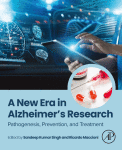Chapter 1 - Unveiling the complexity of Alzheimer's disease: Introduction and its pathophysiology
References (0)
Cited by (0)
Copyright © 2025 Elsevier Inc. All rights are reserved, including those for text and data mining, AI training, and similar technologies.

